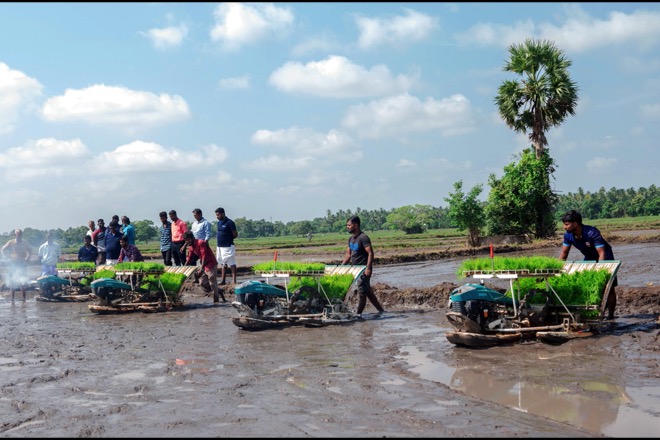The Commercial Bank of Ceylon has embarked on an ambitious mission to propagate technology in the agriculture sector, encompassing all areas of agricultural potential in the country.
This initiative aims at empowering farmer communities and improving the quality and volume of crop yields by fostering sustainable agriculture practices and equipping rural communities with the latest resources and knowledge in modern farming.
The first village to be “adopted” under the pilot project of the programme was Mahilankadu in Kilinochchi, in collaboration with the University of Jaffna and the Department of Agriculture in Kilinochchi.
This first “Agri Modernisation Village” was recently introduced to transplanting paddy seedlings using mechanised technology as the first demonstration of the programme. The event saw the participation of farmers, members of the local farmers’ organisation, and officials and experts from the Kilinochchi area.
This programme on transplanting paddy seedlings using mechanised technology was held in Mahilankadu village and was attended by a large number of local farmers organisations and officials of institutions connected with agriculture promotion.
Commenting on the initiative, Commercial Bank’s Deputy General Manager – Personal Banking Mr Delakshan Hettiarachchi said: “This transformative initiative of the Development Credit Department of Commercial Bank for rural communities is designed to bridge the gap between traditional farming methods and innovative technologies. We believe this can revolutionise the agriculture sector, and stimulate the next generation to embrace smart agricultural practices.”
The different elements to be addressed by the ‘Agri Modernisation Village’ programme include access to advanced techniques such as transplanting, sustainable irrigation, and climate-resilient crop varieties that lead to increased productivity and profitability; skills development and training; financial inclusion and access to credit via direct engagement with the Bank; improved livelihoods though better yields and access to new markets; sustainable practices that ensure the long-term viability of farmer lands; and community support and networking.
Additionally, the collaboration with academic and agricultural institutions required to implement the programme fosters a valuable knowledge-sharing environment, the Bank said.
Commercial Bank is the biggest lender overall to Sri Lanka’s small and medium enterprises (SME) sector and the second biggest lender to the country’s agriculture sector. In 2023, the Bank lent Rs 231.655 billion out of the total loans of Rs 704.142 billion to SMEs, accounting for 32.89% of the total in value terms.
Earlier this year, the Bank conducted an ‘Agri Modernisation Fair’ for farmers in the Vavuniya area, bringing together some of the biggest names is Sri Lanka’s agriculture sector to introduce the latest technologies available to them and to promote smart agriculture. This followed an awareness programme conducted for farmers in the North Central Province on the functionalities of drones in the modernisation of agricultural practices.
Programmes of this nature are supported by the Bank’s 19 Agriculture & Micro Finance Units (AMFU) which are located across the country and play a key role in helping the Bank to identify specific needs of entrepreneurs who require assistance to develop either their agriculture activities or micro businesses. These units are dedicated to promoting agriculture lending and micro finance.
Commercial Bank is the first Sri Lankan bank to be listed among the Top 1000 Banks of the World and has the highest market capitalisation in the Banking Sector in the Colombo Stock Exchange (CSE). The Bank is a leader in digital innovation and is Sri Lanka’s first 100% carbon neutral bank. Commercial Bank operates a strategically located network of branches and automated machines island-wide, and has the widest international footprint among Sri Lankan banks, with 20 outlets in Bangladesh, a Microfinance company in Myanmar, and a fully-fledged Tier I Bank with a majority stake in the Maldives.


Sri Lanka for the longest time has been lagging behind in seed investing, these efforts should be greatly appreciated, finally banks are getting out of their traditional mindeset and doing the needful with capital. For a seed capital revolution in Sri Lanka!